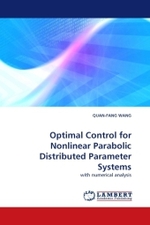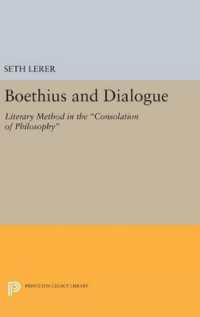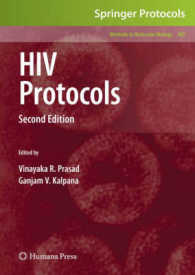- ホーム
- > 洋書
- > 英文書
- > Nature / Ecology
Full Description
Effective Waste Management and Circular Economy: Legislative Framework and Strategies is an invaluable resource for researchers, policymakers, implementers and PhD, graduate and Under Graduate level students in universities and colleges analysing the legal framework, strategies in waste management, circular economy adoption, use of mathematical and statistical modelling in setting waste management strategies, sanitation and Hygiene in waste management. While huge wastes are wasted by dumping, there is potential of resource circulation by enforcing legislative framework to effective resource utilisation and creating business opportunities. Circularity of resources in waste streams can contribute to a more secure, sustainable, and economically sound future through the followings:
Effective legal framework, strategies and policy instruments,
Adoption of circular economy and recycling technologies,
Support of IoT and appropriate decision making and modelling,
Adoption of alternatives to plastics and other hazardous materials,
Economic feasibility as business case, commercialisation, generating employment.
This book addresses most of the above issues in a lucid manner by experts in the field from different countries, which are helpful for the related stakeholders, edited by experts in the field.
Sadhan Kumar Ghosh, Professor at Jadavpur University, internationally well-known expert working in varied interdisciplinary fields including waste management having research collaboration in 40 countries.
Sasmita Samanta, Pro-Vice Chancellor, KIIT Deemed to be University, Bhubaneswar, Odisha, India having research experience in management & academic administration.
Harish Hirani, Director at CSIR-CMERI, Durgapur, having wider fields of research in IIT Delhi with a number of research collaboration.
Carlos RV Silva Filho, Director, Presidente, ABRELPE, Sao Paulo/SP - Brazil & Presidente, International Solid Waste Association, Netherlands has experience of working in number of international projects
Contents
Section I : Legal Framework, Strategies in Waste Management & Circular Economy.
1. Pollution-specific appraisal of surface water quality with limited resource approach: A meso-scaled study of the Durgapur Industrial region, West Bengal, India. 2. Emissions from the incineration of municipal solid waste: Effects of legal and technological progress. 3. Legislative support to curb marine littering through wastes coprocessing by promoting Circular Economy. 4. Waste segregation at the source in Germany - A key component of sustainable waste management systems. 5. A study on the legal and administrative support for proper management of world-famous Shri Jagannath Temple at Puri. 6. Gate to gate life cycle assessment of hydrothermal carbonization process for food and yard waste. 7. Waste Monitoring and Management: Strategies, Innovations and Safety Considerations. 8. Waste management strategy of SME sector towards Environmental Sustainability. 9. Trajectory Planning for Autonomous Vehicles and its implementation in effective Waste Management
Section II : Circular Economy adoption in Waste Management
10. Sustainable waste management towards circular economy in Nigerian context: challenges, prospects and way forward. 11. Indonesia main (city level) waste bank for waste management towards circular economy: a case study of Bandung City. 12. Sustainable Methodology for Mechanized Segregation of Legacy Waste and Reclamation of Landfill Area
Section III: Use of Mathematical and Statistical Modelling in setting waste management strategies
13. ANN modelling on the adsorptive removal of phenol using biological and industrial waste materials. 14. Achieving consistency of judgment matrix in Analytical Hierarchy Process. 15. Approach for indexing site selection criteria and its suitability for treatment storage and disposal facility. 16. Using a composite index to form an urban score card for basic infrastructure services. 17. Comparison of linear and nonlinear regression methods for equilibrium modelling of ammonia adsorption by error analysis criteria using cost effective waste camellia sinensis. 18. A Decision Support System for Environment Friendly Sustainable Model of IT Service Sector Industries
Section IV : Case Studies on WM, Sanitation and Hygiene
19. Synergistic Interaction among Supplementary Cementitious Materials (SCMs) for Sustainable Solid Waste Management. 20. Challenges to ensure healthy living through sanitation and hygiene coverage: study on Narail District, Bangladesh. 21. Alternatives of Plastics used in in Food Packaging. 22. Meta-Analysis of Studies on Solid Waste Management in the Philippines. 23. Urban flood induced solid waste management in some metropolitan cities - an overview. 24. Study of some polymeric coagulants using spent tea leaves as a source of natural dye supporting circular economy concepts.








